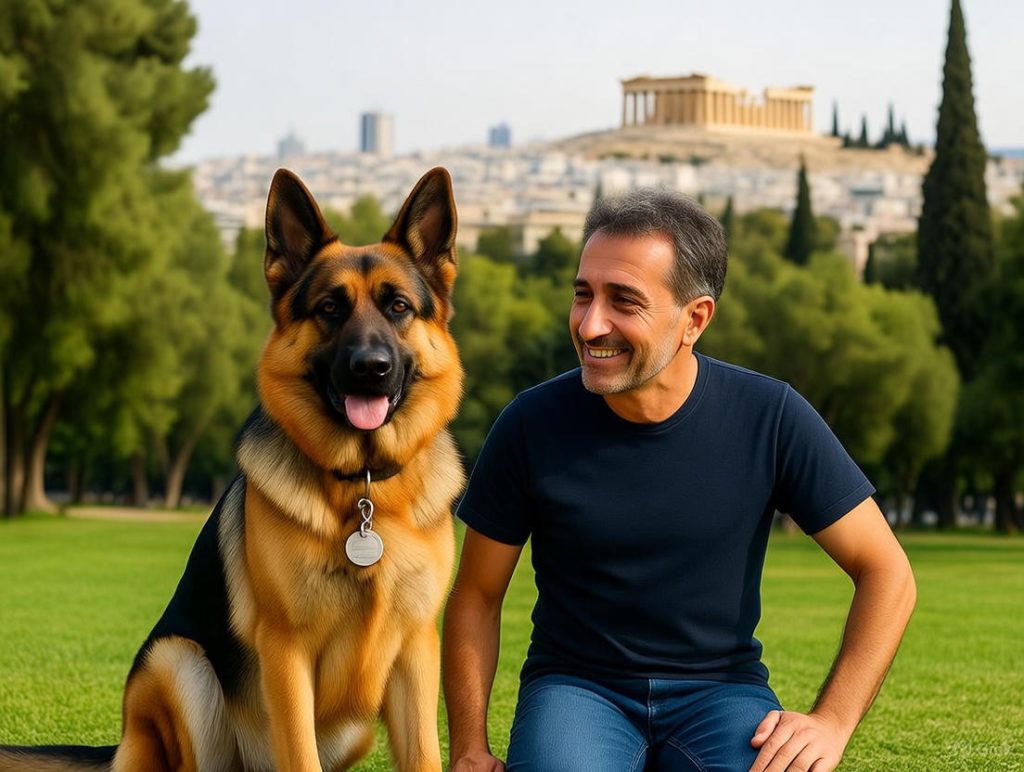In the sun-drenched streets of Athens or the idyllic islands of the Aegean, dogs have long been part of Greek life—from loyal companions in ancient myths like Odysseus’s faithful Argos to modern-day pets roaming with their owners. Yet, with Greece’s growing urban pet population and ongoing challenges with stray animals, it’s time to innovate. Imagine a “Dog License”—much like a driver’s license, but for canine companionship. This certification would require owners and their dogs to pass a combined exam: a knowledge test for the human on responsible pet care, and an obedience or cognitive assessment for the dog, evaluating basic commands, socialization, and impulse control. Upon success, owners gain privileges like off-leash walking in designated areas, access to dog-friendly public transport, and even priority in pet-friendly accommodations.
This system isn’t just a bureaucratic whim; it’s a gateway to safer, happier communities. Below, we explore the multifaceted benefits of implementing such a Dog License in Greece, drawing on lessons from similar programs in countries like Germany and the UK, where certified dogs enjoy expanded freedoms.
Enhanced Public Safety and Reduced Incidents
One of the most immediate advantages is bolstering safety for everyone—humans and animals alike. Greece already mandates microchipping and rabies vaccinations for dogs, but a Dog License would elevate this by ensuring only well-trained pairs venture off-leash. Picture fewer dog bites or altercations in bustling tourist spots like Plaka or Santorini’s cliffs. The exam could include scenarios testing a dog’s response to distractions, such as children or other animals, mirroring cognitive tests used in service dog training.
By requiring proof of competence, the system would weed out irresponsible owners, potentially cutting down on the estimated thousands of annual animal-related incidents reported to Greek authorities. Parks and beaches could designate “licensed-only” zones, allowing certified dogs to roam freely without alarming families or triggering complaints. This proactive approach aligns with Greece’s EU commitments to animal welfare, fostering a culture where dogs are seen as integrated community members rather than potential hazards.
Improved Animal Welfare and Happier Dogs
At its core, the Dog License promotes ethical pet ownership, directly benefiting the dogs themselves. Passing the exam would necessitate training in positive reinforcement techniques, ensuring dogs aren’t just obedient but also mentally stimulated and emotionally secure. Cognitive exams, such as puzzle-solving or recall tests, could identify early signs of behavioral issues, leading to timely interventions.
In a country grappling with a high stray dog population—exacerbated by economic pressures and tourism— this license could incentivize adoption and responsible breeding. Owners might receive discounts on veterinary services or training classes as a perk, encouraging spaying/neutering and regular health checks. The result? Fewer abandoned dogs overwhelming shelters like those in Athens or Thessaloniki, and more canines living fulfilling lives. Studies from similar certification programs show trained dogs exhibit lower stress levels, reducing issues like anxiety-induced barking or destructive behavior.
Boosting Tourism and the Economy
Greece’s economy thrives on tourism, with millions flocking to its shores annually. A Dog License could position the nation as a premier pet-friendly destination, attracting eco-tourists and families who travel with their furry friends. Licensed owners could enjoy off-leash hikes in national parks like Olympus or beach access on dog-welcoming islands, complete with perks like waived fees at archaeological sites or priority ferry boarding.
Economically, this opens revenue streams: training centers could flourish, creating jobs for certified trainers and vets. Pet-related businesses— from cafes in Mykonos to eco-lodges in Crete—might offer “licensed dog” discounts, stimulating local economies. Imagine marketing campaigns highlighting “Greece: Where Dogs Roam Free Responsibly,” drawing from successful models in pet-welcoming spots like Barcelona. With Europe’s pet industry booming, this could add millions to Greece’s GDP while differentiating it from less accommodating neighbors.
Promoting Responsible Pet Ownership and Community Harmony
Education is key to the license’s success. The owner’s exam could cover topics like nutrition, legal responsibilities, and environmental impact, turning casual pet keepers into informed advocates. This ripple effect builds community harmony: fewer noise complaints in apartment-heavy cities like Patras, and more inclusive public spaces where non-dog owners feel comfortable.
Socially, it could bridge divides. In rural areas, where herding dogs are common, the license might include specialized modules for working breeds, preserving cultural traditions while modernizing them. Urban dwellers benefit from reduced litter in parks—trained dogs are less likely to cause messes—and stronger bonds between neighbors through community training events. Overall, it cultivates a national ethos of empathy, where pet ownership is a privilege earned through commitment.
Health and Environmental Perks for All
Beyond the obvious, the Dog License encourages healthier lifestyles. Off-leash privileges motivate owners to exercise more, combating Greece’s rising obesity rates with daily walks in scenic spots like the Acropolis hills. Dogs, too, get physical and mental workouts, leading to longer lifespans.
Environmentally, well-controlled dogs minimize wildlife disturbances in protected areas, supporting Greece’s biodiversity goals. Cleaner public spaces reduce plastic waste from unnecessary leashes or bags, aligning with the country’s green initiatives. In a warming climate, shaded off-leash zones could even incorporate hydration stations, promoting sustainability.
A Step Toward a Dog-Friendly Future
Implementing a Dog License in Greece isn’t without challenges—logistics like exam centers and enforcement would need careful planning—but the rewards far outweigh them. By blending ancient reverence for animals with modern responsibility, this system could transform pet culture, making Greece a model for the Mediterranean. Policymakers, animal welfare groups, and citizens should rally for pilot programs in major cities. After all, in a land where dogs have symbolized loyalty for millennia, isn’t it time they—and their owners—earned the freedom to thrive?
What do you think? If you’re a Greek dog owner or enthusiast, share your thoughts—perhaps this could spark a real movement.
